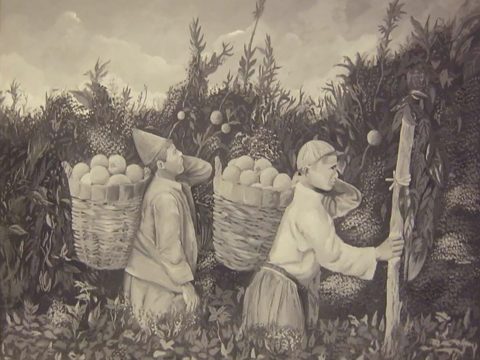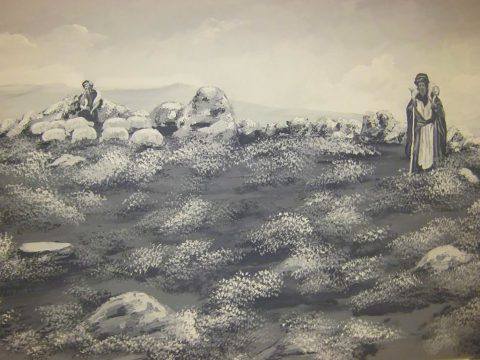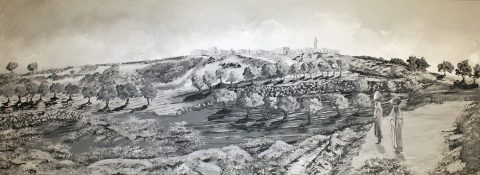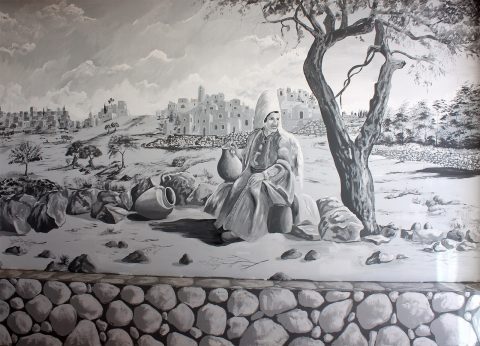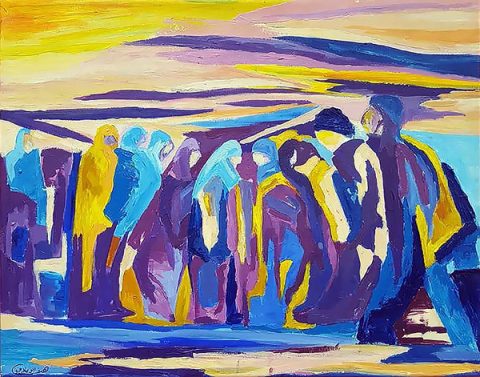
Palestinians have rich and significant relationships with the land. Traditions like farming orange and olive groves are longstanding traditions and means of Palestinian livelihood, dating back to pre-Ottoman history. Since 1918, settlements have encroached on Palestinian farmland, and especially since 1948, Israeli-only roads and “security barriers” have partitioned Palestinian farmers from their land. But the tradition and livelihood of farming continues.
The UN office for the Coordination of Humanitarian Affairs in the Occupied Palestinian Territory found that, as of 2012, “48% of the agricultural land in the [Occupied Palestinian land] is planted with 8 million olive trees; the vast majority are in the West Bank,” and these groves support at least 80,000 families. These groves are often sites of both state and settler violence against Palestinians, giving the groves a new dimension: a form of resistance, or samud.
Themes of rootedness and connection to the land appear in much 20th-century and contemporary Palestinian film and literature. Sahar Khalifeh explores a far more complicated or nuanced relationship with the land in her evocative novel Wild Thorns, set in 1972 Nablus. She shows a community in transition and splintered between and within generations, as they recon with the aftermath of the Six Day War, ongoing Occupation, and conflicting attitudes towards and means of resistance. Both withering and confiscated orange groves are a central leitmotif of the novel.
In Ghassan Kanafani’s Men in the Sun is the story of three Palestinian’s quest to find work in Kuwait. The tale speaks to the tragic circumstances faced by Palestinians since 1948, especially those displaced from their land, or shorn from their farmland. The eldest of the three men, Abu Qais, was forced to leave his wife and son after years of poverty, famine even, caused by Israeli confiscation of his olive trees. His is a tale familiar to many after 1948, and one that bears symbolic significance.
In Arabesques, Anton Shammas’ winding tale is rooted to a Palestinian farmtown, Fassuta, that was captured by Israeli Zionists in 1948. Shammas fills the tale with references to olive groves as a life-source of Palestinians, depicts how they serve as a crucial element of Palestinian culture, and alludes to olive trees in the winding (or, arabesque) structure of the novel itself.
Films from Jaffa, the Orange’s Clockwork, about the mass confiscation of orange groves in Jaffa during the Nakba, and The Tale of Three Jewels, about three children in Occupied Gaza in the 1990s, demonstrate the significance of orange groves, from the literal to the far more figurative. In the latter, the children enter orange groves, a primary export of Gaza, to find escape. In the groves, their imaginations provide escape from Gaza’s harsh reality.
And the list goes on. Palestinians have farmed the land for centuries, and their connection to the land is a powerful symbol of rootedness, making clear the injustice of displacement.
Thus in this gallery, we seek to showcase and explore Palestinian relationships with and connection to the land of Palestine. It is a way of exploring Palestinian history, cultural traditions, and sense of belonging on and with the land.
